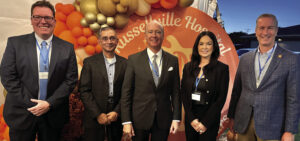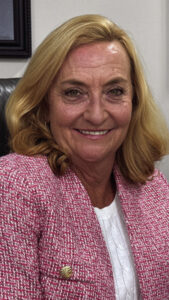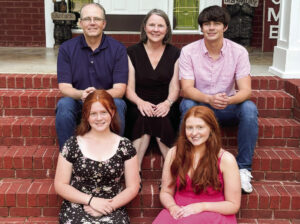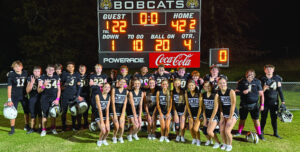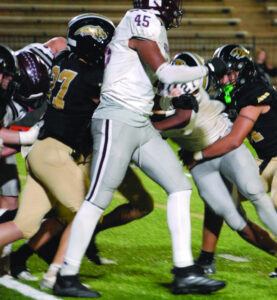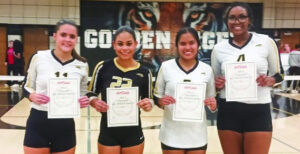Made in Alabama connects students with local careers
RUSSELLVILLE — Three hundred sixth graders from across the county recently spent a day at the Franklin County Career Technical Center to learn about vocational career opportunities.
Career coach Melissa McHenry said the second annual Made in America event introduced students to programs offered at the career tech center. They also learned about Alabama-made products.
“Made in Alabama helps them see that the skills they learn here can lead to real careers,” McHenry said. “It’s about helping them connect the dots between school and the world around them.”
At the health science station, instructor Savannah Sullivan taught students how to perform CPR, including how to find the correct rhythm by playing the Bee Gees’ song “Stayin’ Alive.”
She guided them as they practiced chest compressions on CPR dummies equipped with sensors that indicate if the pressure is too much or too little.
Collision repair instructor Steve Watts showed students how his class restores vehicles from dented and dull to polished and professional. He explained sanding techniques and let students feel the difference between coarse and smooth surfaces.
Jana Boyd, substitute instructor for the cosmetology program at the Franklin County Career Tech Center, demonstrates and discusses styling techniques.
“We go from 80-grit to 500-grit before paint,” Watts said. “It’s not instant. It’s time and work, but it’s rewarding to see the finished product.”
Watts said the class covers refinishing, painting and bodywork repair, preparing students for careers that can pay well after graduation.
“I’ve had students who are just two years out making $100,000 a year on commission,” he said. “They start at $12 to $15 an hour, but if they stick with it and get good, there’s no ceiling.”
Industrial maintenance instructor Dustan King said his program teaches a wide range of practical skills — everything from welding and hydraulics to electrical work.
“It’s kind of a jack-ofall- trades class,” King said. “The more they can learn when they’re young, the better off they’ll be once they get out of high school.”
Collision repair instructor Steve Watts discusses skills students can learn in his classes.
He said students who complete the program often go on to high-paying careers, sometimes earning six-figure salaries within a few years.
King said the program’s variety keeps it engaging and relevant.
“They learn real-world skills,” he said. “It’s handson, it’s challenging, and it can change their lives.”
Students in Jamie Johnson’s drafting and design program learn to design everything from house plans to mechanical parts using computeraided drafting software.
They also experiment with 3D printers, turning digital designs into real, tangible models.
“This class gives them a chance to see how something goes from an idea on the screen to something they can hold in their hands,” Johnson said.
He said the program helps students understand how design concepts move from blueprint to realworld applications. Those who advance in the course can earn dual-enrollment college credit.
Students saw examples of 3D-printed projects, including a model car with turning wheels, and heard how each part is designed and printed separately.
Industrial maintenance instructor Dustan King talks to students about what they can learn in his classes.
Johnson said the process shows how technology ties into fields like architecture, engineering and manufacturing.
Representatives from Tiffin Motorhomes were on hand to explain how the skills students learn in classes like drafting, welding and cabinet making translate directly to real-world manufacturing applications.
“This event ties into what we do at Tiffin,” explained Jamie Purser, Class A quality control manager. “We can’t build a motorhome without proper engineering and proper drafting. The same skills these students learn here — cabinet making, welding, industrial maintenance — they all play a role in what we do.”
He said the company employs several hundred people across its Red Bay and Vina facilities, where the motorhomes are produced and maintained.
“We buy the bare chassis, but all the frames, trusses and floors are built right there,” Purser said. “Everything’s handcrafted.”
He added that introducing students early to trade skills can prepare them for stable, rewarding work.
“We get people who don’t know how to read a tape measure or run a screw gun,” he said. “These programs teach the basics that make all the difference.”
Representatives from Pilgrim’s Pride also participated, talking about opportunities in Franklin County’s poultry industry.
“I think this event is great because it lets kids see what companies are in their community and what kind of work they do,” said Heather Aldridge, supervisor at the hatchery.
She said Pilgrim’s Pride supports local schools and libraries and helps students learn about “the live side” of production — the farms and processes that happen before the chickens reach the plant.
Broiler service tech Kent Walker said the company offers many types of jobs, not all of which involve direct contact with animals.
“There’s a lot of opportunity,” he said. “People might not realize how many different jobs there are — maintenance, electricians, robotics, personnel. It’s not just one thing.”
The Franklin County Cattlemen’s Association grilled hamburgers and hot dogs for those attending the event.
“We always try to support local events, especially if they’re tied to agriculture or related industries like welding, carpentry or diesel mechanics,” said Michael Pounders, the group’s president.


